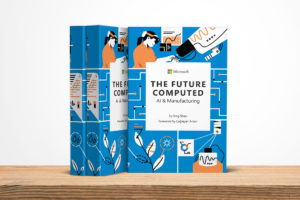
The Future Computed: AI and Manufacturing
Today, Microsoft is releasing The Future Computed: AI and Manufacturing. This new book provides an in-depth look at how artificial intelligence (AI) is transforming the manufacturing sector by optimizing digital operations and driving efficiencies, enabling new products and services, and allowing for safer work environments. The book also offers a timely look at how society can respond to some of the challenges AI creates, and the need to develop new laws and regulations to address workforce disruption and develop AI in an ethical and responsible manner.
Written by Greg Shaw – co-author of Hit Refresh with Microsoft CEO Satya Nadella and The Ability Hacks about technology for people with disabilities – this book is the second in a series that began with the release last year of The Future Computed: Artificial Intelligence and its role in society.
In an era when digital technology is changing almost every aspect about how people live, work, play, and learn, we believe it is important to think carefully about the complex questions that AI raises. Through our Future Computed series, we hope to encourage a broad set of conversations about how AI can empower people in a trusted and respectful environment that benefits everyone.
We decided to focus the second Future Computed book on manufacturing because the industry plays such a central role in the global economy, and because, as in previous industrial revolutions, it is once again at the forefront of adopting new transformational technologies.
This means manufacturing is one of the industries that is leading the way in exploring the full potential of AI. It also means manufacturers already find themselves responding to some of the challenges of AI — challenges like how to optimize processes to keep up with the new speed of business, how to ensure their existing and incoming workforce has the right skills to build and leverage AI, and how to create the right organizational culture to realize the benefits of data-driven decision making.
In the book, you’ll hear from a range of customers including ABB, Colfax, Jabil, Tetra Pak, Toyota Materials Handling and ZF about the progress they are making on their AI journey. You’ll meet Patrick Bass, CEO of thyssenkrupp North America, who led the effort to implement a real-time cloud-based predictive maintenance solution that is maximizing uptime for 12 million elevators that move 1 billion people every day. And hear from Manuel Torres, a self-taught engineer who has used AI to transform his paper company into a leading supplier of composite material for airplane manufacturers like Boeing and Airbus.
The book also looks at how manufacturers will need to engage with governments and civil society to help craft new regulatory frameworks, guiding the use of this new technology as the industry transforms. These frameworks should address key societal challenges, including the need to retrain workers to take on new roles and be part of a talent supply chain capable of realizing the potential of AI in manufacturing. They should also address how to store the data generated from connected supply chains and digital factories safely, securely, and in ways that respect privacy and ensure that AI is used ethically. Drawing on insights from customers and policymakers from around the world The Future Computed: AI and Manufacturing offers Microsoft’s perspective on how we might move forward on these important issues.
The Future Computed: AI and Manufacturing does not pretend to have all the answers. But we hope it will play a role in furthering discussions about how to deliver this new technology responsibly and help manufacturers better understand the steps they need to take in their AI journey.
In writing the book, Greg conducted interviews with Microsoft manufacturing customers who are at the forefront of figuring out how AI can drive success for their companies. He also interviewed workforce experts, union leaders, and policymakers from around the world and identified some common themes across these conversations.
The Future Computed: AI and Manufacturing points out the critical importance of cultural change as part of the digital transformation and the need for strong senior leadership in overseeing this shift. It also highlights the way in which the managers inside manufacturing operations who are closest to the workforce are often the most sensitive to AI’s impact on employees and are focused on improving worker safety and job satisfaction. And, while there is notable positivity from leaders in manufacturers around the impact of AI on jobs, there is also an understanding that a lot of work is needed to reinvent how we prepare people for the workforce.
The advent of AI makes this an exciting time to be in manufacturing. But it is also a time filled with great uncertainty. For anyone interested in learning more about why AI is so important to the future of manufacturing, I hope The Future Computed: AI and Manufacturing offers a useful guide. I also love the final remark that suggests leaders of today should lead with optimism.
I encourage you to download a copy here. You can also find out more about the people and companies profiled in the book and access additional information by visiting Microsoft’s AI and Manufacturing website. Additional resources can also be found in the Microsoft AI Business School.
The post The Future Computed: AI and Manufacturing appeared first on The Official Microsoft Blog.
Source: The Official Microsoft Blog
